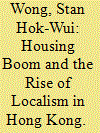| Srl | Item |
| 1 |
ID:
162095


|
|
|
|
|
| Summary/Abstract |
Localist parties have become an emerging force in Hong Kong’s political landscape. What has caused the rise of localism in the city? Extant studies focus on cultural and social factors. In this article, we propose a political economy explanation: global and regional economic factors have caused a housing boom in Hong Kong since the mid-2000s and produced impactful redistributive consequences. While homeowners benefit tremendously from the hike in asset prices, non-homeowners stand to lose. Their divergent economic interests then translate into political preferences; homeowners support political parties that favour the status quo, while non-homeowners tend to support those that challenge it. Using a newly available public opinion survey, we find preliminary evidence in support of our argument. In particular, homeowners are less likely to identify with localist parties and tend to vote for pro-establishment ones. High-income earners, however, are more likely to vote for localist parties.
|
|
|
|
|
|
|
|
|
|
|
|
|
|
|
|
| 2 |
ID:
181401


|
|
|
|
|
| Summary/Abstract |
Scholars of electoral autocracies accord far more attention to post-election protests than pre-election ones, as the former have the potential to trigger a regime transition. We argue that pre-election protests can have a significant effect on election outcomes. In particular, they are likely to deepen social cleavages along two dimensions: age and immigrant status. The 2019 social unrest in Hong Kong provides a unique opportunity to evaluate the electoral impact of pre-election protests. Comparing public opinion data related to the 2019 and 2015 District Council elections, we find strong empirical support for our argument, as immigrant status and age are strong predictors of voting choices and voter turnout. Our findings imply that exposure to democratic protests may not help in bridging the gap in political attitudes between immigrants and natives.
|
|
|
|
|
|
|
|
|
|
|
|
|
|
|
|